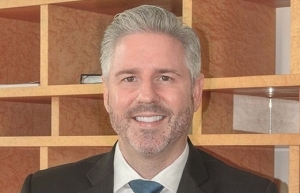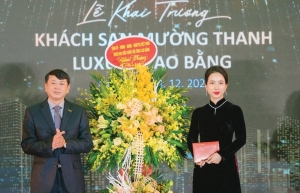The recovery of hospitality
Markets like Vietnam and Thailand have felt the knock of China’s continued pandemic policy, given it is a key source for both countries. Before the pandemic, China was the largest outbound travel market in the world, with as many as 150 million overseas trips in 2019. Much of the recovery in Southeast Asia will depend on the reopening of China, and Vietnam is no exception.
 |
| Mauro Gasparotti-Director, Savills Hotels Asia-Pacific |
Major international travel markets have already reached volumes similar to 2019, except for the Southeast Asian market, where occupancies are 70 per cent of the 2019 level.
Vietnam has only achieved 60 per cent of the 2019 occupancy level, and the return of international guests was underwhelming in the first 10 months of 2022, with only 2.3 million arrivals.
With the absence of the Chinese, South Korea has become Vietnam’s largest source of international arrivals. In the same period, they accounted for 620,000, or 26 per cent, of international arrivals. There have been strong upticks from new source markets like India with 82,000 arrivals between January and October, with over 20,000 arrivals in October alone, increasing 25.8 per cent compared to the same period in 2019.
The domestic demand is driving tourism recovery in Vietnam. By October, there were 91.8 million domestic arrivals, exceeding the 85 million in 2019.
Operations are still fragmented in Vietnam and certain locations perform better than others. The recovery of coastal resorts has been slower than anticipated, especially for those that rely on the international demand.
For example, Nha Trang and Cam Ranh only achieved 45 per cent of 2019 occupancy and Danang has only achieved half of the 2019 level. Several hotels in Ho Chi Minh City and Hanoi have recovered well with encouraging results from business travellers, long-term guests, and business groups.
However, room rates in Hanoi and Ho Chi Minh City are still 15-20 per cent less than 2019 levels. Upscale to luxury properties have recovered better. The luxury segment was resilient throughout the pandemic and continues to perform well, with rate recovery outperforming the overall market.
In Vietnam, there are many projects under construction, which will pressure rates and occupancies. In the next three years, 47,000 hotel and condotel keys are expected, equal to 30 per cent of the current base. This large pipeline will result in greater competition.
Large, mass-market products with great room inventories will be more challenging. These properties appeal to groups and are reliant on the return of Chinese travellers and other key source markets. They also compete merely on price.
Hotel M&A activities
 |
| The recovery of hospitality |
As the market recovers, hotel investment volumes in Asia-Pacific have shown strong signs of activity. There were 459 deals in 2021 worth a total of $14.9 billion, surpassing the pre-pandemic five-year average. From 2022 onwards, investor appetite will remain robust as the gap between sellers and buyers appears to have narrowed. Well-located, high-quality hotel assets in key markets will remain keenly coveted.
Regionally, South Korea, China, and Australia have attracted the most capital. However, developing markets like Vietnam have been less popular because of a lack of quality assets for sale in main cities. Interestingly, Japan has continued to garner strong attention, especially after its recent reopening.
While investment confidence is returning alongside pent-up travel demand, the market outlook is still clouded by downside risks, including uncertainty surrounding border policies in China, the increasing cost of air travel and flight times, and rising inflation in most source markets, regardless of the hotel sector’s claim to adopt quickly with agile pricing to work within the inflationary climate.
Hotel mergers or acquisitions have been relatively quiet in Vietnam over the past two years due to the lack of quality products. In 2022, transaction volume slowly picked up, with three notable resort transactions. However, assets are still relatively expensive, with a large difference between owners’ expectations and the attitudes foreign investors have towards risk and reward.
What investors want
Properties in Ho Chi Minh City and Hanoi are top-of-mind investment targets for foreign and local investors because they have delivered solid occupancies and rates post-pandemic because of the lack of new inventories. There is still high demand for city hotels but is limited to the properties with the right inventories, facilities, and construction quality.
Interest comes from private equity funds, local and foreign high-net-worth individuals, and corporates, which usually opt for third-party management companies like internationally recognised brands.
Resort properties are also interesting to hotel investors. To stand out, these properties must have good beach access, decent design, and the correct mix of facilities. These are considered ‘trophy assets’ and encourage purchasing under recent market uncertainties.
Looking forward, environmental, social, and governance compliance is increasingly important in the hotel sector. Rising energy costs, a shift in preferences towards sustainable tourism and green accommodation, and the growing demand for commitments towards the environment and climate are accelerating the sector’s focus on sustainability. Properties that properly embrace sustainability have an advantage over other market players to attract foreign investments.
The recent market adjustments will delay the completion of several projects. In the upcoming months, there may be increased opportunities to acquire assets which have not been available previously, and will be attractive to foreign and local investors.
There is increased interest from opportunistic foreign investors who want to capitalise on Vietnam’s current credit crunch and current downturn. They are sitting on large pools of capital and are waiting for the right opportunities in which to invest.
 | Sustainability: now an everyday word for tourism and hospitality The country is looking forward to a full resurgence of tourism after the complexities of the last couple of years. General manager of InterContinental Saigon Hotel & Residences Justin Malcolm talked to VIR’s Van Hanh about the demand for travel to Vietnam heading into 2023. |
 | Embracing development of hospitality and real estate in Vietnam At Vietnam’s largest hospitality and real estate conference titled Meet the Experts 2022 on November 10, analysts and businesses exchanged crucial information and openly discussed the evolution of and barriers to the country’s real estate and hospitality markets. |
 | Lodgis Hospitality Holdings offers Ixora Ho Tram by Fusion A developer's brand is essential to a real estate project and contributes to its long-term asset value. Part of The Grand Ho Tram Strip, one of Southeast Asia’s largest integrated resorts, Ixora Ho Tram by Fusion, is brought to the market by international developer Ho Tram Project Company and its institutional investor Lodgis Hospitality Holdings. |
 | Hospitality industry joins ESG Environmental, social, and governance criteria are still a new concept for most tourism and hotel businesses in Vietnam, but the success stories of a number of pioneering brands have contributed to inspiring businesses to embrace them more, with several companies picking up awards at a seminar organised by Vietnam Investment Review last week. |
 | Breaking records with Muong Thanh Hospitality Lighting up the map of the Vietnamese hospitality industry, Muong Thanh Hospitality has built a position in the hearts and minds of guests from home and abroad. |
What the stars mean:
★ Poor ★ ★ Promising ★★★ Good ★★★★ Very good ★★★★★ Exceptional
Related Contents
Latest News
More News
- Tides of Heritage: A Tet speciality at InterContinental Phu Quoc Long Beach (January 20, 2026 | 12:08)
- Muong Thanh launches Lunar New Year gifts inspired by tradition (January 16, 2026 | 16:41)
- The Grand Ho Tram seeks responsible entertainment with pilot casino access (January 16, 2026 | 10:56)
- Ocean Resort by Fusion Quy Nhon launches Lunar New Year 2026 package (January 15, 2026 | 11:11)
- Regent Phu Quoc announces general manager appointment (January 15, 2026 | 11:06)
- Fusion to debut two landmark hotels in early 2026 (December 26, 2025 | 11:46)
- Pan Pacific Hanoi unveils festive season of light and music (December 15, 2025 | 18:22)
- JW Marriott Hotel & Suites Saigon unveils festive initiatives (December 12, 2025 | 15:12)
- Festive magic by nature unfolds at JW Marriott Cam Ranh Bay Resort & Spa (December 11, 2025 | 18:17)
- The Reverie Saigon presents festive programme (December 11, 2025 | 18:15)

 Tag:
Tag:



















 Mobile Version
Mobile Version